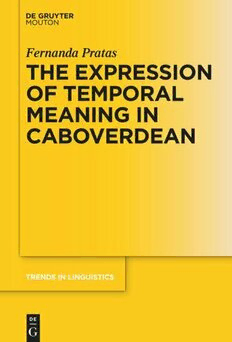
The Expression of Temporal Meaning in Caboverdean PDF
02021·1.4 MB·English
Most books are stored in the elastic cloud where traffic is expensive. For this reason, we have a limit on daily download.
Preview The Expression of Temporal Meaning in Caboverdean
Description:
One hot topic in contemporary linguistics concerns how we express the passage of time in natural language. In particular, interesting questions have been raised as to how formerly understudied languages fit into deep-rooted theoretical frameworks, which among other features comprise a grammatical category of tense. This monograph mainly contributes to this debate in two complementary ways: through a detailed description of a large set of new data from two varieties of Caboverdean, a Portuguese-related language, and through a novel approach to the role of its few temporal morphemes, which allows to better define how tense meanings, aspect, and mood, together with other linguistic and extralinguistic information, provide what we understand as past, present, and future. The adequate study of this non-standardized language, with its impressive internal variation, thus brings new insights to old theoretical problems. Additionally, a welcome side effect of these new descriptions and analyses is that they promote a scientifically grounded attitude towards linguistic diversity.
See more
The list of books you might like
Most books are stored in the elastic cloud where traffic is expensive. For this reason, we have a limit on daily download.
